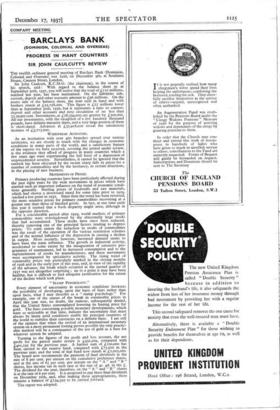COMPANY MEETING
••■••,--
BARCLAYS BANK
(DOMINION, COLONIAL AND OVERSEAS)
PROGRESS IN MANY COUNTRIES SIR JOHN CAULCUTT'S REVIEW
Tim twelfth ordinary general meeting of Barclays Bank (Dominion, -Colonial and Overseas) was held, on December 9th, at Southern House, Cannon Street, London. -
Sir John Caulcutt, K.C.M.G. (the chairman), in the course of his speech, said : With regard to the balance sheet as at September 3oth, 1937, you will notice that the total of £1 to millions, reached last year, has been maintained. On the liabilities side, current, deposit and other accounts amount to £96 millions. On the assets side of the balance sheet, the item cash in hand and with bankers stands at £22,758,000. This figure is £21 millions lower than at September 3oth, 1936, but it represents a ratio to current, deposit and other accounts and note circulation of no less than 23.39 Per cent. Investments, at L28,334,000, are greater by £500,000. All our investments, with the exception of a few hundred thousand pounds, have definite maturity dates, and a very large portion of them is short-dated. Advances at £35,918,000 reveal the satisfactory increase of £3,713,000,
WIDESPREAD ACTIVITIES.
As an institution with over 400 branches spread over various territories, we are closely in touch with the changes in economic conditions in many parts of the world, and a satisfactory feature of the reports we have received, covering the period under review, is the evidence they afford of progress in many countries which a few years ago were experiencing the full force of a depression of unprecedented severity. Nevertheless, it cannot be ignored that the outlook has been obscured by the recent sharp falls in prices for a number of commodities and by, the hesitancy, in certain directions, in the placing of new business.
MOVEMENTS OF PRICES.
Primary producing countries have been particularly affected during the past eight years by the wide movements in prices which have exerted such an important influence on the trend of economic condi- tions generally. Sterling prices of foodstuffs and raw materials, which had shown a downward trend for some time prior to 1929, reached a low point in 1932. Since then the trend has been reversed, the more sensitive prices for primary commodities recovering at a greater rate than those of finished goods. In fact, at one time early this year it seemed that a fresh disparity might arise, although in the opposite direction. For a considerable period after 1929; World markets of primary commodities were overshadowed by the abnormally large stocks that had accumulated. These stocks have since been reduced, thereby removing one of the principal factors tending to depress prices. To some extent the reduction in stocks of commodities was the result of the operation of the various restriction schemes and of the normal influence of the depression in causing a decline in output. More recently, however, increased demand seems to have been the main influence. The growth in industrial activity, accelerated to some extent by the inauguration of extensive pro- grammes of rearmament, led to increased consumption and to the replenishment of stocks by manufacturers, and these movements were accompanied by speculative activity. The rising trend of commodity prices was particularly marked in the closing months of 1936 and in the early part of this year, and, in view of the rapidity of the advance, the break which occurred in the second quarter of 1937 was not altogether surprising ; up to a point it may have been healthy, but is difficult to find adequate justification for the extent of the decline which took place.
" SLUMP PSYCHOLOGY."
Every element of uncertainty in economic conditions increases the possibility of developing, upon the basis of fears rather than upon facts, what I may describe as a " slump psychology." For example one of the causes of the break in commodity prices in April this year was, no doubt, the rumour, subsequently denied, that the United States contemplated lowering its buying price for gold. The fears concerning possible monetary developments, which were so noticeable at that time, indicate the uncertainty that must always be latent until conditions enable the principal countries of the world to stabilise their currencies on a definite basis. I am still of the opinion that when the revival of an international monetary system on a more permanent footing proves possible the only practic- able method will be a continuance of the use of gold as a base for whatever system be adopted. ; Turning to the figures of the profit and loss account, the net profit for the period under review is £431,209, compared with £401,192 for the previous year. A further sum of £IOO,OOO has been carried to the reserve fund, compared with £75,000 in the previous year, and the total of that fund now stands at £2,025,000: The board now recommends the payment of final dividends at the rate of 8 per cent. per annum on the cumulative preference shares, and at the rate of 6f per cent. per annum on the " A " and " B " shares, less income tax in each case at the rate of 4s. 4d. in the L. The dividend for the year, therefore, on the " A " and B " shares is at the rate of 6 per cent. It is proposed to pay these final dividends on December loth, and, after making these appropriations, there remains a balance Of £134,320 to be carried forward.
The report was adopted.














































 Previous page
Previous page